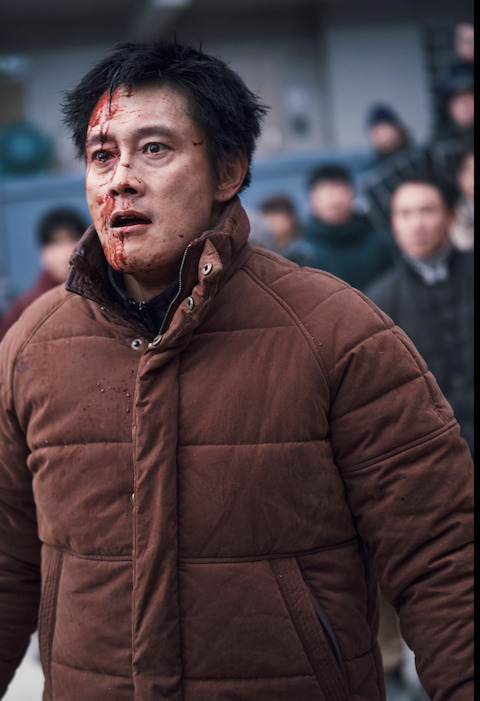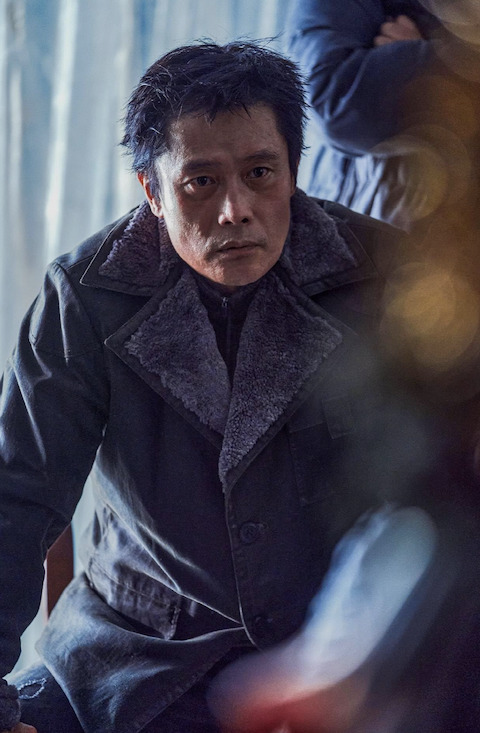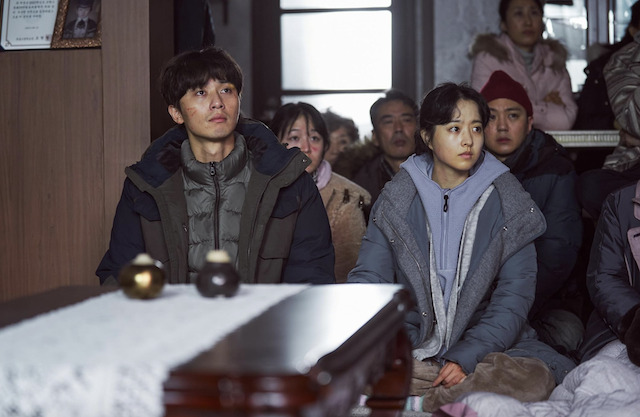
Concrete Utopia : The world has been reduced to rubble by a massive earthquake. While no one knows for sure how far the ruins stretch, or what the cause of the earthquake may be, in the heart of Seoul there is only one apartment building left standing. It is called Hwang Gung Apartments. As time passes, outsiders start coming in to Hwang Gung Apartments trying to escape the extreme cold. Before long, the apartment residents are unable to cope with the increasing numbers. Feeling a threat to their very survival, the residents enact a special measure.
Genre: Drama, Action
Original Language: Korean
Director: Um Tae-hwa
Writer: Um Tae-hwa, Lee Sinji, Jo Seul-yeah
Runtime:
Production Co: Climax Films, BH Entertainment

@Courtesy of Lotte Entertainment
Press conference with Actor Lee Byung-hun, Director Um Tae-hwa
Q: This is based on a Web Toon. what drew you to that story and specifically to the second section of a Web Toon.
Em Tae-hwa: Before I actually watched this web-toon, I was always interested in Korean apartments of the dwelling type. I was wondering why they were built in the same form and they keep getting demolished and rebuilt in this exact apartment. I was interested in why the value of this apartment is more than just the dwelling place. It’s becoming more of an asset for people.
It was sad thinking that rather than being somebody’s home, it is more valuable as an asset. While I was thinking of that, I came across this web-toon called “Cheerful Outcast.” The backstory of that web-toon is that everything has collapsed and there’s only one apartment building remaining in Seoul. It had a great background story to talk about this kind of dwelling in Korean society. I started to adapt this web-toon into a film.
Q: Talk about what it means to live in an apartment in South Korea? In addition to the class structure in general, there’s even a class structure within the building itself like who the owners are and who’s just renting.
Em Tae-hwa: After the Korean War, Korea has rapidly developed. One of the reasons was because the people have had this very strong sense of community which contributed to the rapid development of the country — that’s the good side. But on the other hand, because of their collective activism, if you stand out from the group, they try to restrain or reject your individuality. That transfers over to the type of residents themselves. If you see the apartments they all look very similar, but even within the same building, you might find yourself living under a name brand. Because the living spaces are so small, a comparison culture causes a social class problem as well.
Q: Actor Lee, your character is very complicated. He does some bad things but isn’t necessarily an evil person. What drew you to this role? What was it like to play someone who has dimensions and isn’t a cut and dry villain?
Lee Byung-hun: I asked the director a lot of questions about this character and of course, there’s a description in the script about this character. But, I think most of the details developed as I was having my conversation with Tae-hwa. Yeong-tak [my character] just lost everything — his family and home and he wasn’t interested in living — he had no interest in anything to go on. In these very depressing circumstances, all of a sudden, something happened and he started to gain power. He’s slowly transformed in this very extreme situation. I think that was a very important part of his character. As an actor, that’s the part that I focused on and that’s how I build my character.
Q: This is for both of you. What did the success of “Parasite” have on the Korean film industry? Was it a real game changer; where does that sit in the whole scheme of things?
Em Tae-hwa: After the achievement that the “Parasite” director [Oscar winner Bong Joon-ho] had in the Cannes Festival for people like us, working in Korea, it felt like a different world. It was something unattainable and seeing that the director had worked within the same boundaries, [we] saw how they created this achievement. We felt very close to this. It looked and felt more attainable. It gave us a lot of confidence that we could actually be part of that as well.
Q: Does actor Lee want to contribute to that answer?
Lee Byung-hun: He was definitely a pioneer in terms of what he achieved in the Korean film industry. After that, a lot of people started to be interested in K content or K films. As director Bong said, people are overcoming this one-inch tall barrier and are interested in watching foreign films or international films, even with the subtitles. This is such a huge transformation and what he has done within The Academy, it’s very symbolic. It has encouraged a lot of filmmakers in Korea and given us a lot of confidence as well.

@Courtesy of Lotte Entertainment
Q: There’s a lot of focus on class in “Concrete Utopia” as indeed, there was in “Parasite.” The fact that Yeong-tak has crossed between classes by hiding his roots, gave him a power and insight that the other characters didn’t have. That gave him insights that the other characters didn’t have and therefore more power and an ability to understand them and therefore to rise to the position that he does? Yeong-tak has information that other people don’t have. Does he then have more power essentially?
Lee Byung-hun: It was very interesting as an actor to play this role. In the beginning, he had nothing and was very depressed, but with the situation, he started to gain power. When he heard that the world had been reset, it gave him the confidence to restart his life. At that point, he was thinking about what he could do for the residents of the apartment. Then, at some point, this power started to become overwhelming and he started to be obsessed with the power itself.
There’s a situation during which he uses power, not for good, yet you can’t say that it’s all his fault. That subtlety was very interesting for me. I want the audiences to debate whether he was an evil or good person — that anyone in this kind of situation might make the choices he makes. That was a point that director Tae-hwa and I wanted to stress throughout the film.
Q: Tae-hwa, do you want to weigh in?
Em Tae-hwa: At the end of the movie, I didn’t want to give an answer to the audience saying this is good or evil. Instead of giving an answer, I wanted the audience to ask themselves. I wanted the film to be a question asking of the audiences and the characters in the film. There’s no absolutely evil or good characters. I wanted them to be ordinary people that anybody could identify with. These characters include Yeong-tak. You see them make not so great choices; you can’t support what he’s doing, but I wanted to make it so that people can at least understand where he’s coming from.
Q: Byung-hun, in your previous work, you demonstrated versatility by playing complex roles that showcased your diversity as an actor. Your character in this movie combines protective instincts for his family in the residential complex with a darker side that led him to extreme actions against outsiders. How did you view the complexity of this role compared to some of the other diverse characters you’ve played in your previous work — taking into account the intricacies and depth to your portrayal in “Concrete Utopia.”
Lee Byung-hun: In terms of this film’s genre, I haven’t seen a black comedy genre in the Korean industry for a long time. It was refreshing to perform this new style of character, to see how he transforms within this extreme situation; as the character is gathering power, it’s making subtle changes within the character. As an actor, I thought it was a very important point that I had to really focus on in my performance.
Compared to my previous characters, I didn’t really try to look different from the previous characters that I played. I just focused on how I could comply with the screenwriter’s intentions. Compared to some of the other characters that I played recently, there were a lot of emotional explosions within Yeong-tak. There’s a lot of expressions of emotions which made him different.
Q: This is for both director and actor. One of the themes of this film is about obsession and possession; it’s about these characters being obsessed with possessing their space and place in this building. Talk about how the thing that we try to hold on to the most becomes a thing that destroys us as a theme throughout this film? Can you talk about it artistically as a director and as an actor? How did you see your roles within the film itself?
Em Tae-hwa: I don’t know if you’ve been to Korea, but there’s so many apartments and apartment complexes in Korea. Everybody lives in similar residence structures. For Koreans owning an apartment — versus not owning it — has almost become a standard, a measurement for how you can provide for your family or not. It’s a house, a dwelling place, but it directly relates to survival in a way and it gives you a standard as to whether you’re leading a good life or not.
That branches out to social class as well. That’s why people are really obsessed with the apartment, and, in this film, we created more extreme situations to portray that obsession in the film. Moreover, these apartments have more real estate value than just being a dwelling place. People think that they’re an asset; it will actually take care of you in the future. When you watch this film, I want the audience to think about what is the meaning of “home?” Is it a resting place for your family or is it something like your personal assets. Looking at that perspective personally made me sad and I wanted to include that in the film.
Q: Does actor Lee want to take that question as well?
Lee Byung-hun: As the director said, that is true, that aspect of it is very becoming more prevalent but the apartment as a space, the owning the apartment or your own house, this is something that everybody dreams of. If you’re the head of a household, this is a thing that you feel like you have to provide for your family. It’s almost an obsessive thing in Korea. If you look at it as the cultural difference in Korea, people are very obsessed with having/owning an apartment or house.
If you understand that as a cultural difference, you’ll understand the film a little bit better. In a way, how you try to achieve something, whether you are moral or immoral, there might be a difference. But there’s really not much of a difference between when you’re trying to own something and being obsessed with it versus trying to achieve something on your own.
Q: What was the most memorable moment for both of you during the production?
Em Tae-hwa: The most memorable scene for me is of course, all the scenes. But there is a scene where I’ve never really worked with so many actors at the same time on the same set. It was very challenging for me. With that residents meeting, we were doing the vote in the beginning of the film where all these actors were gathered together and preparing for that scene, I had a lot of thoughts of how to make it more smooth. How do I work with this ensemble of characters together? The first thing I thought about was to find good actors. I auditioned about 3000.
I was able to select very good actors through that effort. Second of all, I gave them very detailed backstories. I thought that was important as well and it’s impossible to give them all these detailed backstories on set; there was no time for that. Before shooting, I told them what units they lived in, their family members and careers before the disaster and who passed during the disaster. Like their families with all this background information, I listened to how these individual actors want to interpret their own characters. If it was something that I agreed with, we just went with that mindset. if it was something that I had to add a little bit, then I helped them build their characters. On the day of the filming, we all gathered and it was just amazing to see all these characters come alive and how they really breathed life into their characters.
I tried to film the movie as chronologically as possible. The resident meeting scene was in the very beginning and after four months, there’s a scene where everybody’s gathered together in the parking lot and trying to kick Yeong-tak [Lee Byung-hun] out of the premises. It just becomes mayhem. For all these characters, they have lived as their own characters for 34 months.
Just before filming that mayhem scene. I asked a question: What do you think of your character, do you think you will still support Yeong-tak or do you think you want to be part of getting rid of him? I suggested that they have their own answers based on how they lived as an apartment resident throughout those 34 months. That was reflected in their acting while we were filming that scene. Again it was a very refreshing experience and I had a lot of fun shooting that scene.
Lee Byung-hun: For me, one of the most memorable scenes in this film was actually shot during July to August. It was the hottest and very humid in the middle of summer in Korea. To compare it to the city here, it could be like New Orleans weather, very humid and hot. All the actors had to wear padded jackets and winter clothing. We had to portray that but we were in the middle of summer and not just a regular summer.
It was a very severe, cold wave that was coming in the summer — we had to read that every day. That scene was probably filmed in the beginning or middle of the film. There were about 200 people just pushing each other back in that mayhem scene where they’re fighting against each other. There was a camera filming from above so that you can see a sea of people and they look like waves of people. It was just amazing to see that scene and everybody in the middle of summer acting as if we’re in the middle of winter.
Check out more of Nobuhiro’s articles.
Here’s the trailer of the film.

